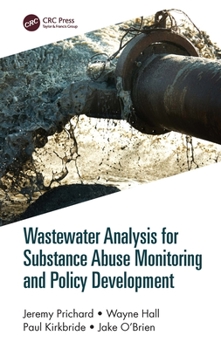Wastewater Analysis for Substance Abuse Monitoring and Policy Development
This book addresses how to estimate substance use and thereby evaluate policies intended to reduce the harms caused by drugs and other substances. Wastewater analysis (WWA) can provide efficient, affordable, fine-grained and objective data on population substance use trends on a very large scale.
The authors discuss the potential implications of WWA as a new method for understanding substance use in a variety of settings and ignite a discourse with policy makers, criminologists, epidemiologists and other disciplines about the need for collaboration with WWA scientists. The book also features an explanation of the costs and harms of substance use with academic literature from criminological and epidemiological sources and reports from lead agencies.
Additional features include:
Details on the origin of wastewater analysis in environmental science
Description of analytical chemistry methods for tracing a wide variety of substances, including illicit drugs, alcohol, tobacco and other chemicals
Exploration of the major empirical problems in estimating population consumption of alcohol, tobacco and drugs at the international and national level
Examination of the principles of human research ethics and their application to wastewater analysis
Wastewater Analysis for Substance Abuse Monitoring and Policy Development is a valuable tool for analytical chemists, wastewater scientists and criminologists, as well as researchers and policy makers across disciplines who work in drug sectors.
Related Subjects
Engineering Law Science Science & Math Science & Scientists Science & Technology Technology




